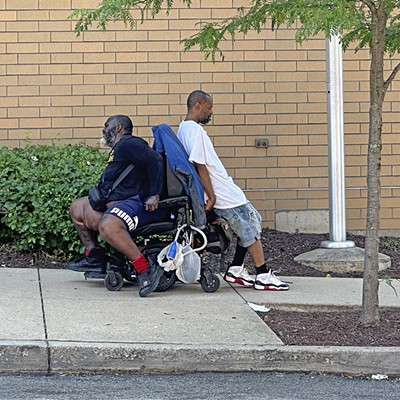Like many regional colleges, Point Park University is facing several concurrent challenges.
COVID dampened enrollment and created hurdles for the university. Meanwhile, some alumni and current employees say money is tight at the school known for its performing arts conservatory, especially after Point Park spent $60 million building the Pittsburgh Playhouse and paid out $1.25 million to settle claims it provided an inadequate education during lockdown.
And then there's the president situation — namely, Point Park has had three university presidents since 2021. That includes current officeholder Chris Brussalis, whose swift, unanimous promotion from board member to interim leader to permanent president has raised some eyebrows on campus. Meanwhile, the Hill Group, the consulting company Brussalis chaired until "semi-retiring" more than two years ago, seems to be planning a sweeping overhaul of Point Park's admissions, programs, and possibly faculty.
Concurrently, the vibe on campus seems to be shifting. Students with marginalized identities say that since Brussalis took over, they're noticing more hostility from incoming freshmen. Some of them worry changes to the student body's makeup could have implications for their safety.
Still, Brussalis says he's the man for the job.
"This is a very challenging time in higher ed. An extremely challenging time. Our strategic plan has to be transformational," Brussalis tells Pittsburgh City Paper. "We're all about trying to create an atmosphere and an environment where we're stimulating creativity and innovation really grounded in experiential learning."
He characterizes Point Park as "one of the most dynamic urban universities in the country" and says a combination of access to workforce internships and co-ops, improved student life, national recruitment, fundraising, and improvements to facilities will help the university not just survive, but thrive. Brussalis' administration sees these plans going hand-in-hand with the betterment of the Golden Triangle.
"As the downtown university, we can be the driver of Renaissance III," he says. "There's no better entity to drive that transformation."
Brussalis is hardly alone in the region in the recency of his appointment. Six of 11 higher ed institutions in Greater Pittsburgh have had an administrative changing of the guard in the years since COVID. However, some prominent alumni and current students say the speed of his appointment was alarming. Combined with Brussalis's conservative personal politics, they worry his appointment portends unilateral changes to a university home to many queer students.
A bold vision
Recent alumna and former Student Government Association (SGA) president Kendra Summers says Brussalis' rapid ascent occurred "without consultation" of on-campus groups, including the SGA (Brussalis says 50 stakeholders, including SGA members, had input on his performance as interim president). "It's concerning," Summers tells City Paper. "Point Park has a very diverse student body — there should be more involvement from people you're aiming to protect." She says former university president Don Green's brief tenure and sudden departure were jarring.
"I had no idea which signature was going to be on my degree," she says.
Former SGA president Dennis McDermott (who preceded Summers in office) says they perceive a "disconnect" between the business-friendly trustees and the student body in aggregate. They say the board seemed to favor Brussalis early in the search process in spite of student misgivings. "They don't talk to students at all," they say of the trustees. McDermott worries many board members see their office as a "prestige position."
"It would probably come as a surprise if they actually walked through campus to see how proud students are of their identities," McDermott says.
Calling it a "competitive advantage," Brussalis says Point Park's diversity "makes us special." That diversity, he says, is central to the successful implementation of a new strategic plan that runs through 2030.
City Paper was able to view an undated draft copy of the strategic plan in September. Left intact, it would substantially change facets of daily life at Point Park, ranging from student housing to academic programs.
Some of the initiatives pertain to enrollment — under Brussalis, the university is aiming for a massive bump in admissions. His administration is hoping to increase enrollment in the Conservatory of the Performing Arts by 30% even as colleges' student bodies shrink across the nation. Also envisioned is a rise in transfers, additional varsity athletic teams, and more international students.
Some initiatives pertain to faculty. Under the new plan, the university would review and "teach out programs that are no longer relevant." Brussalis denies that this means imminent layoffs — "we're hiring," he says, though he describes examining a variety of strategies for greater solvency as his "fiduciary responsibility."
The university also proposes evaluating processes for faculty review and studying faculty pay "to better align compensation with peers." For those following the WVU saga farther south, where the state school's leadership is purging hundreds of faculty, these words are likely to raise questions.
Other foreseen changes include the addition of "mixed-generational housing" within existing campus facilities. This plan would see "graduate artists, Pittsburgh Scholar House single mothers and children, and retirement residences" added to residence halls.
There's also the now-public study of the feasibility of sharing services with other local colleges and universities such as Robert Morris and Carlow. The Hill Group undertook the study with former Point Park president Paul Hennigan, who's now a senior consultant at Hill.
Brussalis says sharing services could save area institutions millions on procurement. "I think we spend probably $34, $40 million on stuff," Brussalis says. Combining different schools' operations would mean, instead of $40 million, "you now have an organization that spends three-quarters of $1 billion per year, you have some incredible buying power."
It's nothing if not an ambitious plan. However, items such as the addition of lacrosse programs seem out of character for an arts-forward, largely queer university, McDermott says.
"If they think athletics are the solution, they're going to lose students," they say. They add that many students choose the university specifically "because it doesn't have frats and that atmosphere of frats."
Brussalis has continued to do charitable work in support of his former college fraternity, Phi Delta Theta. Ted Black, Point Park's senior vice president of institutional giving and a former NHL executive, was also a Phi Delta Theta brother. He and Brussalis both graduated from Allegheny College in 1987.
But fraternity membership isn't the only way Brussalis differs from some Point Park students.
The specter of Florida
Point Park's trustees are disproportionately white and male. Among them are several financial executives and investment managers, as well as PA Rep. Rob Mercuri, whose anti-LGBTQ positions place him outside the Point Park mainstream.
Mercuri represents the growing suburban area encompassing Brussalis's home in Richland Twp., where (as this author covered in a previous role) Brussalis's wife Christina has been a sharp-elbowed conservative school board member.
Christina Brussalis — whom one current Point Park employee alleged President Brussalis called "the First Lady of Point Park" during the early days of his tenure — has been an outspoken advocate for school choice and against the perceived encroachment of critical race theory in K-12 education. She was a panelist at the conservative PA Leadership Conference in March 2023, which featured Rep. Scott Perry, who played a major role in the Jan. 6, 2021 insurrection, and arch-conservative Fla. Gov. Ron DeSantis. Florida has its own recent history of higher-education tumult.
Among other things, Christina Brussalis advocated for "plant[ing] parents' groups that are conservative and fighting for conservative values in every school across the state."
President Brussalis's own political donations skew conservative. Though he did donate $2,500 to Democratic congressional candidate Larry Maggi in June and September of 2012, the vast majority of his donations have been to conservative Republicans. In the summer of 2021, Brussalis donated almost $6,000 to conservative congressional candidate Sean Parnell. In spring and summer of 2022, he donated $2,250 to GOP candidate Jeremy Shaffer.
While some Point Park trustees have also donated to Republicans, Brussalis's contributions to the party's candidates and PACs have been larger and more frequent; they total $21,959.31 since 2001. Christina Brussalis also donated thousands to Shaffer and the WinRed PAC. (For comparison, former Point Park president Hennigan appears to have donated a total of $250 each to Democratic legislators Mike Doyle and Bob Casey in 2006 and 2012, respectively.)
The current employee, who spoke to CP on background for fear of jeopardizing their career, says the couple’s leanings, and particularly Christina Brussalis' rejection of an equity policy in Pine-Richland School District, are alarming. Some students agree.
Current student Henry*, who asked to remain anonymous but has worked with Brussalis as a member of a student organization, says he fears the reversal of recent gains made in pursuit of more robust diversity, equity, and inclusion practices. He worries Pres. Brussalis isn't ready for hard conversations around such issues, especially after the university restructured its Office of Equity and Inclusion last year. "That's very heavily impacting us in a negative way," he says, although SGA recently added a DEI-focused officer role.
Henry says Brussalis has seemed unprepared to tackle issues such as those facing trans students. "Everything felt very business-oriented," he tells CP. "Every time we brought up a genuine, serious issue affecting the LGBTQ community, he skirted around it hardcore."
"How can I help transform this university?"
Henry worries bigoted behavior at Point Park is already on the rise — he says he's observed "an influx of freshmen with less tolerant beliefs" accompanied by microaggressions, including deliberate misgendering of trans students and vandalism of the Gender & Sexuality Spectrum Alliance's flyers.
"There's kind of the vibe that freshmen are less tolerant or were not expecting [Point Park] to be as liberal and queer as it is," he says. Henry says one friend overheard someone saying they were "fine with gay people, but not expecting it to be this much."
Brussalis says he's made every effort to support all students and has worked closely with both SGA and student organizations, including the Gender and Sexuality Spectrum Alliance (GSSA). "I've met with GSSA probably more than any group on campus," he says. He's worked closely with the org since taking office, including on a 10-point plan to ensure queer students' safety.
Summers hopes the university can be more proactive about seeking student input, especially when hiring administrators who make university-wide policy decisions.
"It sets a very dangerous and interesting precedent to make those decisions without consulting the president of the SGA," she says. She hopes the current administration can cement a policy in writing that guarantees SGA a seat at the table for big hires.
Current SGA president Marc Palombo characterized the current situation at the university as "hang[ing] in uncertainty." In an emailed statement, he told CP in part, "the President appears willing to assist us in achieving our objectives but remains undoubtedly practical and conservative in his approach to running the university.
"Nevertheless, as we're still in the early stages of the academic year, I prefer to reserve judgment and evaluate him based on his actions and the course of events moving forward."
Time will tell if Point Park can avoid culture-war pitfalls and realize the ambitious goals laid out in the draft strategic plan. Part of that will depend on Brussalis' rapport with the student body. Current student Henry reports that Brussalis has been congenial and visible on campus. Brussalis says he's made every effort to serve as a resource for students, faculty, and staff.
"I'm out and about all the time. My family's on campus. My wife's engaged," Brussalis says.
Brussalis says he's in the "fourth quarter" of a fulfilling life — he views his legacy now through the lens of impacting students and leaving the university better than he found it. His main concern at this critical early stage: "How can I help transform this university, lead the way, and help transform one of the most beautiful cities in the world?"















